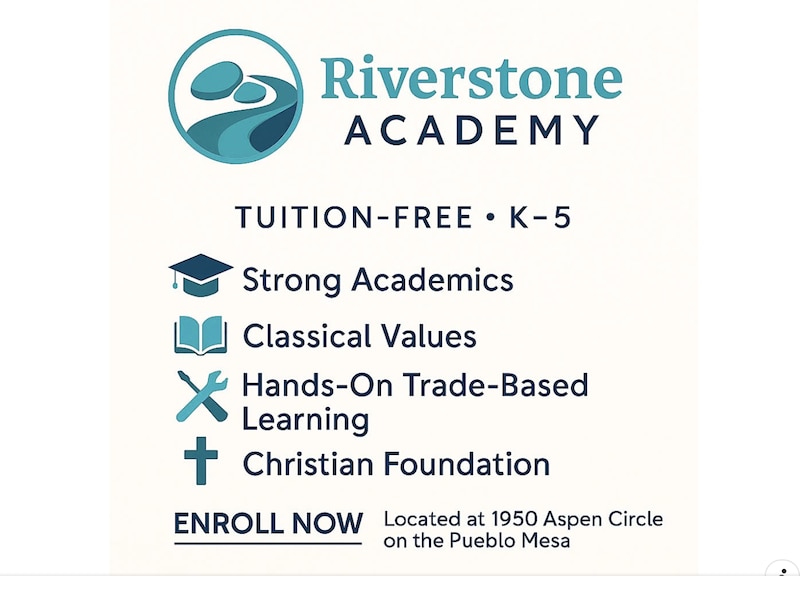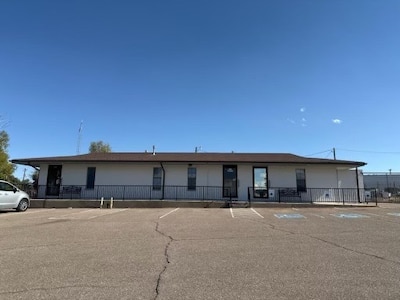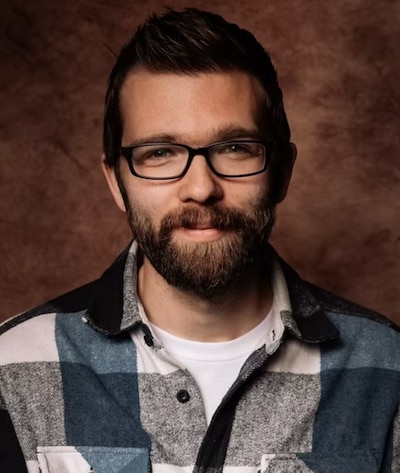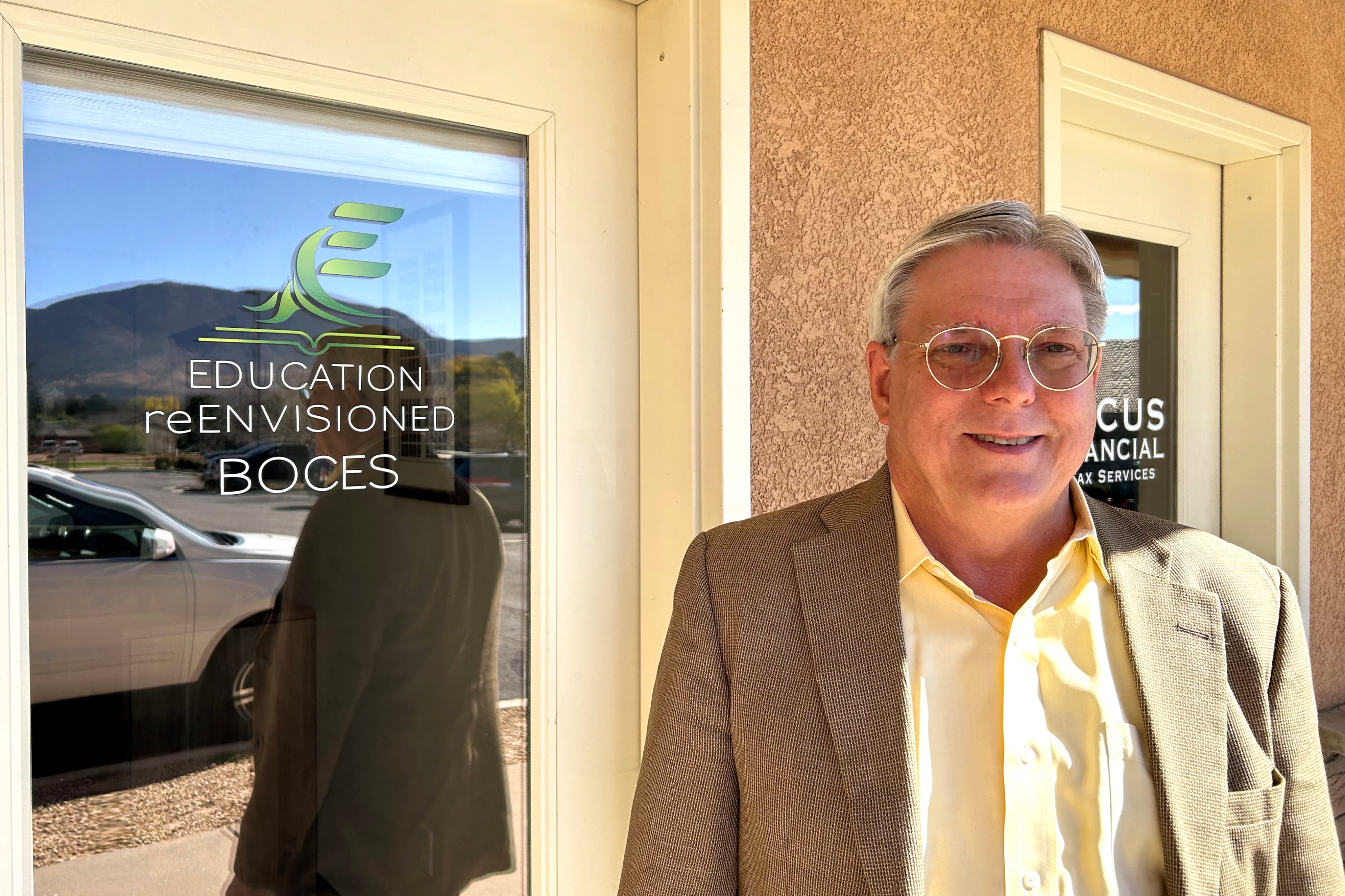Sign up for Chalkbeat Colorado’s free daily newsletter to get the latest reporting from us, plus curated news from other Colorado outlets, delivered to your inbox.
A group that authorized what its leader called Colorado’s “first public Christian school” told the state education department Tuesday that it would be unconstitutional to deny the school state funding.
The school, called Riverstone Academy, opened quietly in southern Colorado this August, just months after a tie at the U.S. Supreme Court blocked the nation’s first religious charter school from opening in Oklahoma.
Riverstone Academy’s website describes a tuition-free public elementary school that “blends strong academics with classical values, hands-on trade-based learning, and a Christian foundation.”

But Colorado’s constitution requires that public schools be nonsectarian — meaning not religious — and the Colorado Department of Education is pushing back. Department officials have suggested that Riverstone students may not be eligible for public funding. The school’s backers said they are “alarmed at the threat” and that not funding the school would amount to religious discrimination.
If the disagreement were to end up in court, the outcome of any legal challenge likely would turn as much on the bureaucratic details of how Riverstone Academy is organized and authorized as on larger constitutional questions of religious freedom. And Riverstone Academy likely won’t be the last case to test the boundaries between church and state and the evolving definition of a public school.
“The people who want to tear down the wall of separation between church and state are going to keep pushing these issues because they think they have a sympathetic audience in the current Supreme Court,” said Steven Green, a law professor at Willamette University who specializes in church-state issues.
Few mentions of school’s Christian character in paperwork
Riverstone Academy opened this fall and has just over 30 students occupying four classrooms in a leased space just outside Pueblo city limits. It was authorized by Education reEnvisioned BOCES. The group is one of the state’s 21 Boards of Cooperative Educational Services, which offer services such as special education to member school districts.

Riverstone exists due to an unusual arrangement involving the authorizer, two nonprofit groups, and two school districts 60 miles apart. Unlike most public schools, which typically take more than a year to plan and open, Riverstone was proposed and launched within months.
Quin Friberg, Riverstone’s executive director, said the school is meant to serve local families who seek an education that “feels like private school but doesn’t cost like private school.”
“I mean that in the sense of smaller classrooms, the religious element, and … we have an emphasis on kind of hands-on [activities],” he said.

Over the summer, BOCES authorized the school and contracted with Riverstone Academy, a new nonprofit Friberg heads, to run it. Riverstone subcontracted with a two-year-old Christian education nonprofit called Forging Education, which Friberg also leads, to help run the school.
District 49, which is based near Colorado Springs, is one of the two school districts that belong to the Education reEnvisioned BOCES and serves as the groups’ fiscal agent. An hour south is Pueblo District 70, which is not part of the BOCES but approved an agreement to allow Riverstone to open within its boundaries.
References to the school’s Christian character are absent or muted in Riverstone’s application materials and contracts. An application for a school code submitted to the state in late June makes no mention of Riverstone’s religious nature. It also went unmentioned in the agreement approved by the Pueblo 70 school board in late June and in the contract between the school and the BOCES approved by the BOCES board in August.
Friberg said Riverstone wasn’t hiding anything, but that the school’s religious foundation wasn’t a relevant response to questions on some of the documents.
Unlike the Oklahoma Catholic school at the center of the U.S. Supreme Court case, Riverstone is not a charter school. Rather, both the BOCES and the Colorado education department have referred to it as a “contract school,” a term that’s not defined in state law.
Ken Witt, executive director of the BOCES, said Riverstone is a public school because it was authorized by the BOCES, and the application went through the BOCES’ normal review process.
“It was a quality educational program that they were describing,” he said. “And we said, [the] U.S. Constitution and federal law says you don’t discriminate based on religion, so we are not going to discriminate based on religion.”
State officials warn that religious public schools are not allowed
Although the first day of school at Riverstone was Aug. 11, state officials didn’t address its Christian affiliation until two months later.
That’s when Witt described Riverstone as “Colorado’s first public Christian school” near the end of a routine 12-minute update about his group’s programming at a District 49 school board meeting on Oct. 9.
“We’re delighted that they came to us and said, ‘Hey, we’d like to operate this school,’” he told the board.
He then cited a 2020 Supreme Court decision in Espinoza v. Montana Department of Revenue, which found that states could not exclude religious schools from private school voucher programs.
Witt has long been involved in the Colorado education world, frequently championing conservative positions, including expanded school choice. He was recalled from the Jeffco school board in 2015 following anger over proposed changes to the district’s AP U.S. history curriculum and other issues. In March, Witt resigned as superintendent of the Woodland Park school district.
The BOCES contract with Riverstone states that “The School shall constitute a public school in Colorado” and be subject to all applicable state laws. But it also describes Riverstone as “a provider of educational services at the School” and says Riverstone “is not itself a ‘public school.’”
At the Oct. 9 meeting, one member of the District 49 school board, which leans conservative, expressed alarm after Witt’s briefing on Riverstone.
“Eroding that separation of church and state is very concerning, and for us to be a partner in that … does not sit well with me,” board member Mike Heil said.
Board president Lori Thompson immediately responded, “Just a note of clarification, separation of church and state is not contained in the United States Constitution.”
“Separation of church and state” commonly refers to the First Amendment’s prohibition on government-established religion, but the actual phrase does not appear in the Constitution.
The day after the board meeting, the Colorado Department of Education sent a letter to District 49 and Education reEnvisioned BOCES warning that religious public schools are not permitted under the Colorado Constitution.
The Gazette first reported on the Oct. 9 board meeting and the education department letter.
On Tuesday, District 49 sent a statement to Chalkbeat indicating that district officials will request funding for Riverstone students and let the education department and the BOCES “have appropriate dialogue about eligibility.”
Also on Tuesday, Witt responded to the Colorado Department of Education’s warning letter.
“The U.S. Constitution prohibits discrimination against Riverstone solely on account of its religious affiliation as such exclusion from a generally available governmental benefit would be unconstitutional,” his letter said in part.
A spokesperson for the education department said officials there are reviewing that letter.
Riverstone Academy is relying on a loan from Forging Education — not state money — to operate the school for the first several months.
When asked if he’s worried about the state withholding funding, Friberg said “I’ll just say we went in eyes wide open … on every implication of what we’re doing.”
Is Riverstone the next St. Isidore?
After Justice Amy Coney Barrett recused herself due to a long-standing friendship with an adviser to St. Isidore of Seville Catholic Virtual School, the Supreme Court justices tied 4-4. That meant the Oklahoma Supreme Court decision that blocked the opening of a Catholic charter school remained intact.
The justices didn’t lay out their thinking, leaving open questions about where the line is. But if Riverstone Academy’s backers say it’s a public school, it might not be a good candidate for such a test, Green and others said.
The trio of cases that have redrawn the line between church and state — Trinity Lutheran, Espinoza, and Carson — all involve a religious entity being denied access to a benefit that was available to the general public or to secular entities.
Those conditions don’t apply to public schools. Lawyers in the St. Isidore case argued not that Oklahoma should fund religious public schools, but that charter schools aren’t really public.
“A public school cannot be religious,” said Thomas Jipping, a senior legal fellow at the Heritage Foundation, a conservative think tank. “The government cannot, consistent with the First Amendment, fund a religious school directly. That’s as established as it gets.”
Riverstone opened without much public scrutiny
BOCES generally operate less publicly and less transparently than many school districts.
Education reEnvisioned BOCES doesn’t record its meetings, and some recent board agendas and minutes are not posted online because the group is revamping its website, Witt said. As is true of other BOCES, Education reEnvisioned board members are not elected by the public, but rather appointed by school districts or colleges that are BOCES members or by BOCES board members.
Originally launched under a different name in 2013, the BOCES authorizes several online and bricks and mortar schools as well as more than 50 homeschool enrichment programs around the state.
Last May, Riverstone Academy submitted a new school application to the BOCES.
In June, the BOCES asked the Pueblo 70 school board to approve an agreement allowing Riverstone to open in the district. During a June 10 board discussion of the agreement, which doesn’t mention that the school is Christian, one board member asked Superintendent Ronda Rein if she had anything to share about the school.
She said the school would have 30 students, then said, “That’s really all the information that I have at this point.”
Neither Rein nor any of the district’s five board members responded to messages from Chalkbeat asking if they knew about Riverstone’s religious foundation prior to agreeing to let it open in the district.
Witt said the BOCES didn’t conceal the school’s Christian affiliation in conversations with Pueblo District 70 leaders.
District 49’s school board wasn’t involved in Riverstone’s authorization. However, if the state eventually agrees to fund the school, the money would pass first to District 49, then the BOCES, and then Riverstone.
A copy of Riverstone’s application, provided to Chalkbeat by Witt, makes only one mention of Christian features in a paragraph about science instruction. It notes the use of a curriculum called Berean Builders offering “a Christian worldview in their exploration of scientific topics.” A paragraph about social studies instruction mentions Master Books, but doesn’t say it’s a Christian home school curriculum.
Witt said BOCES board members were aware of the school’s religious affiliation when they approved it in August. The minutes for that meeting are not posted online.
Ann Schimke is a senior reporter at Chalkbeat, covering early childhood issues and early literacy. Contact Ann at aschimke@chalkbeat.org.






